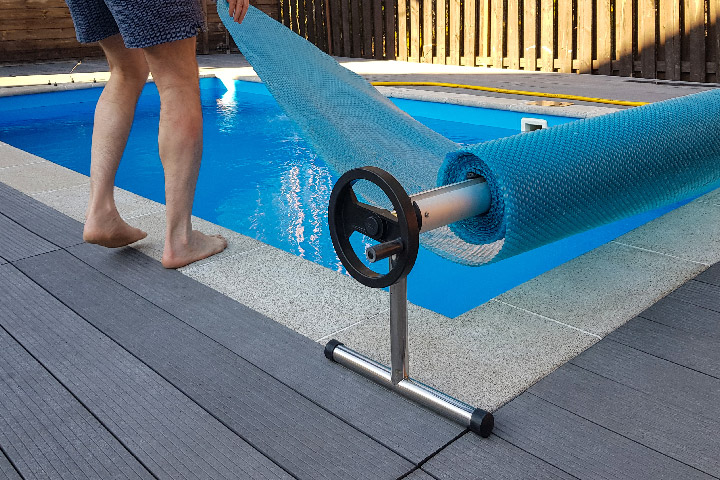Understanding the Different Types, Pros, Cons, and Benefits of Solar Pool Covers
Introduction
As a new pool owner, you may be looking for ways to improve your pool’s energy efficiency and maintain its cleanliness. One of the most effective and environmentally friendly solutions is a solar pool cover. In this article, we will discuss the different types of solar pool covers, their pros and cons, and the overall benefits they provide to help you make an informed decision.
- Types of Solar Pool Covers
There are three main types of solar pool covers, each with its own unique characteristics:
a) Bubble Covers: Also known as solar blankets, bubble covers are made from a lightweight, UV-resistant polyethylene material with small air bubbles that provide insulation and heat retention. They are the most affordable and widely used type of solar pool cover.
b) Vinyl Covers: These covers are made from a heavier and more durable vinyl material, offering better insulation and heat retention than bubble covers. Vinyl covers are available in various thicknesses, with thicker covers providing better insulation and durability.
c) Insulated Covers: Made from multiple layers of material, including foam and vinyl, insulated covers provide the best insulation and heat retention capabilities. They are also the most expensive type of solar pool cover.
- Pros and Cons of Solar Pool Covers
Pros:
- Reduces heat loss and water evaporation, helping maintain pool temperature
- Reduces energy consumption and costs associated with heating your pool
- Helps keep debris out of the pool, reducing maintenance efforts
- Extends swimming season by maintaining warmer water temperatures
- Environmentally friendly option
Cons:
- May not be as effective in colder climates or during cloudy days
- Requires manual placement and removal, which can be labor-intensive
- Can pose a safety hazard if not properly secured or if children and pets are unsupervised
- May not be suitable for all pool shapes and sizes
- Overall Benefits of Solar Pool Covers
Investing in a solar pool cover can provide numerous benefits for new pool owners, including:
a) Energy Savings: Solar pool covers help retain heat in the pool, reducing the need for additional heating methods and lowering energy consumption.
b) Water Conservation: By reducing evaporation, solar pool covers help conserve water, saving both resources and money on your water bill.
c) Reduced Chemical Usage: Solar pool covers help maintain balanced water chemistry by reducing the loss of chemicals due to evaporation, requiring less frequent addition of chemicals.
d) Extended Swimming Season: By maintaining warmer water temperatures, solar pool covers can extend your swimming season, allowing you to enjoy your pool for longer periods.
e) Lower Maintenance: Solar pool covers keep debris out of the pool, reducing the time and effort required for cleaning and maintenance.
Conclusion
Solar pool covers are an excellent investment for new pool owners, offering energy efficiency, water conservation, and other benefits. By understanding the different types of solar pool covers and their pros and cons, you can make an informed decision on the best cover for your pool. Remember to consider your specific pool shape, size, and climate when choosing a solar pool cover to ensure optimal performance and satisfaction. With the right solar pool cover in place, you can enjoy a cleaner, warmer, and more cost-effective swimming experience.
